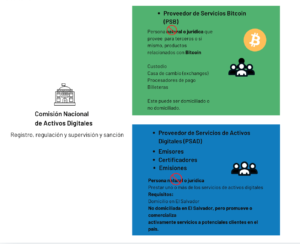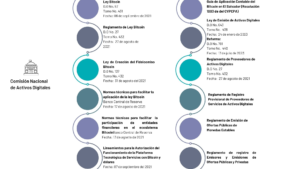
Changes to the Digital Assets Issuance Law in El Salvador
By Claudia Marcela Hernández, September 11, 2024

El Salvador, through the Digital Assets Issuance Law (LEAD) in January 2023, enabled the tokenization of Real-World Assets (RWA) Tokenization, allowing the tokenization of agricultural commodities, debts, and the issuance of stablecoins like a USDT. In August 2024, a reform to the actual LEAD was introduced. This reform contains significant changes for the digital asset industry, including Bitcoin service providers (PSB), Digital Assets Services Providers (DASPs) and actors involved in the issuance of digital assets. The following is an analysis of this reform proposal.
Summary of the Reform: The reforms to El Salvador’s Digital Assets Issuance Law (LEAD), focus on four main areas: 1. New powers for the National Commission of Digital Assets (CNAD), 2. Modification of definitions and concepts related to digital assets issuance and stablecoins, 3. Adoption of new anti-money laundering (AML), counter-terrorism financing (CTF), and counter-proliferation of weapons of mass destruction (CPWMD) measures and programs by Digital Assets Services Providers (DASPs) and Bitcoin Services Providers (BSPs) and 4. Transparency in the development of digital asset regulations.
1. New Powers for the CNAD
In El Salvador, Bitcoin is considered a digital or virtual asset, like regulations in Argentina and Brazil. However, due to the 2021 Bitcoin Law, which recognizes it as legal tender, there exists a dual regulatory framework: one for Bitcoin and another for other digital assets under LEAD (2023).
Article 1 of the Bitcoin Law states that Bitcoin is recognized as legal tender with unlimited liberating power, allowing its unrestricted use in any transaction by individuals or entities, public or private. The reforms introduced to the LEAD on August 16, 2024, would expand the powers of the CNAD, making it the sole institution responsible for regulating, supervising, and sanctioning the digital asset industry, including tokens and stablecoins. This expansion excludes the Central Reserve Bank (BCR) and the Superintendency of the Financial System (SSF) from their current roles in these areas. Notably, the reform does not mention Bitcoin, which would continue to be legal tender.
In addition to implementing the Bitcoin Law and its regulations, the CNAD could require DASPs and BSPs to increase their social capital to mitigate associated risks. The CNAD could also establish confidential agreements with international regulatory entities. For example, the CNAD has signed a memorandum of understanding with its counterpart in Kazakhstan, for information exchange. The following chart shows how the regulatory, supervisory, and sanctioning institutions for digital assets (AD) and Bitcoin in El Salvador would be restructured with the reform:
 2. Modification of Definitions and Concepts Related to Digital Assets Issuance and Stablecoins
2. Modification of Definitions and Concepts Related to Digital Assets Issuance and Stablecoins
The proposed reforms to the LEAD introduce significant changes to the definition of stablecoins, giving them a central role. Now, stablecoins are defined as “a type of digital asset designed to maintain a stable value, referenced or backed by one or more fiat currencies or other low-volatility underlying assets.” This new definition emphasizes stability and low volatility, differing from the previous definition, which did not necessarily consider volatility as a defining factor. Examples of stablecoins include USDT (Tether), backed by the US dollar and widely used in Latin America and the United States, and USDC, issued by Circle, which is used mainly in Europe. Other stablecoins such as EURS, EURC, EURT, and EURA operate in the European market.
The reform introduces the concept of a “public offering of stablecoins,” defined as a technical or commercial proposal communicated massively to the general public, providing sufficient information on the offer’s terms to market or sell stablecoins. This type of issuance can only be conducted through a public offering. A clear example is the issuance of the stablecoin aUSD₮ (Tethered Asset), backed by Tether Gold (XAU₮), authorized by the CNAD in El Salvador, and available in the following web page: alloy.tether.to
3. Adoption of New AML/CTF/CPWMD Measures
New Legal Obligations and the Principle of Territoriality: The reforms stipulate that PSB and PSAD must be legal entities registered in the Commerce Registry, either as foreign branches or joint-stock companies, excluding other types of companies, such as simplified joint-stock companies (SAS). Regarding territoriality, the registration of DASP will enable them to offer services only within El Salvador’s jurisdiction, meaning that any expansion into other jurisdictions will depend on those jurisdictions’ regulations.
Adoption of an AML/CTF/CPWMD Program: BSPs must develop AML programs following FATF standards. They will also be required to maintain accurate records of assets, liabilities, equity, and client data, along with relevant information on customer-requested transactions, executed or not (KYT). BSPs must also establish transaction limit policies, with a recommended limit of USD US$1,000 for digital asset transactions, according to GAFILAT.
Information Security Implementation: BSPs will be obligated to protect customer assets with a high degree of care by implementing policies and procedures designed to prevent the loss, theft, or deterioration of digital assets and maintain a cybersecurity program adapted to the nature of the services offered. Various digital solutions are available for protecting digital assets, such as cold wallet access keys, providing an additional security layer.
Customer service mechanisms: BSPs must keep a record of complaints, including personal data and information about the complaint. They must also publish on their website and display in their user terms the contact information of the CNAD, along with a notice that the CNAD can be contacted to report unresolved complaints against a PSB.
Freezing of digital assets: The reform promotes the freezing of digital assets if requested by the competent authority during an investigation, when the VASP is operating without the authorization of the National Commission of Digital Assets (CNAD) within Salvadoran territory.
4. Transparency in the development of digital asset regulations
The reform excludes the application of transparency measures and public consultation by interested sectors and the public in the approval of any regulation issued by the CNAD. However, it establishes that regulatory improvement principles will be taken into account to create better quality provisions. There have been more than 21 regulations concerning digital assets issued since June 2021 to date, and none have been published for public scrutiny. With this new reform, the CNAD will be responsible for applying the digital asset regulations shown below:
It is worth mentioning that none of the regulations in the table have been published for public consultation under the principles and mechanisms of the Regulatory Improvement Law, and it is unknown whether the different interested sectors were included in their approval process. The current reform under discussion was not published for public consultation under the principles of regulatory improvement.
Conclusions
- The approval of the reform would mean a change in the entity responsible for the registration, regulation, supervision, and sanctioning, shifting from the Central Reserve Bank and the Superintendency of the Financial System to the National Commission of Digital Assets, which will henceforth oversee the registration, regulation, supervision, and sanctioning of Bitcoin service providers.
- The changes in the definitions of stablecoins and digital asset issuance, as well as the actors involved, the regulator clarifies the role each actor plays, making the requirements for each issuance more understandable, thereby offering greater transparency in the regulation for potential clients and investors within the ecosystem.
- By incorporating new measures and strengthening the AML/CFT/CPWMD programs, the reform aligns with FATF recommendations regarding virtual assets, particularly concerning the establishment of transaction limits, information security measures, and the safeguarding of digital assets, as well as other aspects focused on protecting consumer rights.
- The exclusion of the application of the Regulatory Improvement Law represents a setback in terms of transparency and integrity for public administration because it restricts mechanisms for citizen participation and oversight, directly violating the right to access public information.

